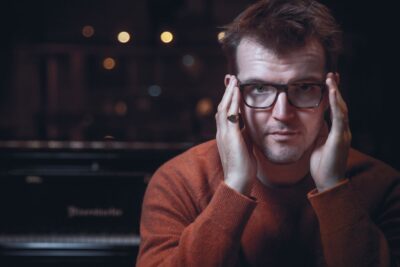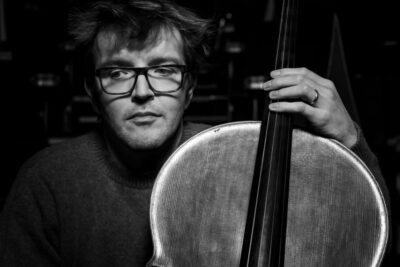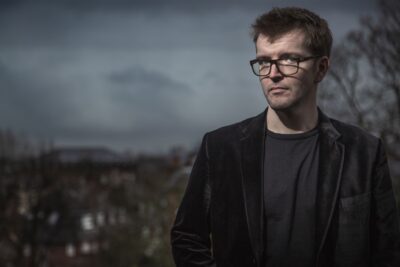„Being influenced by the whole world around us means being inspired by things far away from the classical music world”, and that is what makes music a universal entity”.
The Scottish cellist and one of the most talented composers of today, Peter Gregson, will perform in Belgrade at UK Guarnerius on October 30th. On that occasion, he will premiere music from his fifth studio album „Patina“.
The New Yorker review calls him a pioneer of the new music scene and a „tech-friendly” cellist. He collaborates with the world’s leading technology centers (Microsoft Labs, United Visual Artists, Reactifi, and MIT Media Lab), and he won the Spirit of Scotland award in 2008 for his contribution to the arts in Scotland. Some time ago, he composed the Listening machine and in this experimental music project, he developed a data sonification of Twitter! However, he sees digital technology as a natural step in the development of technology in general: „You must not forget that even the piano is part of technology! Digital technology is no different, it can inspire, it can facilitate, it can also distract… It’s very open to exploration and can take you down paths you never knew existed before,” Peter explains.

He is known to a wider audience as the author of the soundtracks for the film „Little Chaos” and the TV series „The New Pope” and „Bridgerton”, and he also collaborated with musicians from the world of pop music such as Ed Sheeran and Rag ‘n’ Bone Man. However, the original music, as well as the works of renowned composers he performs (Steve Reich, Gabriel Prokofiev, Max Richter…) is what ranks Gregson among the most respected performers and composers today.
So far, he has released six original albums, and with the fourth „Bach recomposed” he began his collaboration with one of the oldest publishing houses, Deutsche Grammophon. „Patina” (2021) and „Quartets 3&4” (2022) followed.
The close connection between technology and music in a specific way was achieved in „Patina” primarily due to the unusual concept of researching presence and absence in music and asking the question of what happens when the melody is removed. In the process of finding answers, Gregson connected the cello with analog electronic instruments, a string ensemble, and a piano. Immediately after its release, the album was a huge success worldwide and has been rated as a great indicator of where contemporary classical music is in the 21st century.
Given the processes of removing or distorting the melody, the result of Gregson’s experiment, despite possible expectations, is not an abstract sound. The melody persists even when electronics dominate long bow movements (Patina, Continuum), while in some cases the dominant impression is gentle, almost sobbing themes (Over and Sense). As one music critic aptly noted: „In the vanguard of contemporary technological breakthrough, we learn again that the organic and imperfect human touch is what creates emotional resonance in great art“.
Announcing the Belgrade concert, the author himself shared his impressions of the album „Patina” and of his work in general, revealing new ways in which we can think about musical art in the digital era.
CLASSICALL: Your idea of researching presence and absence in music is interesting. How did you achieve this on the album „Patina” and what remains when, as you say, „the melody is removed”?

PETER GREGSON: The idea was to create music that felt like it had lived a life, and that we could hear that life on the record. It’s like with your clothes – the best-looking day for a pair of shoes is the day you buy them, but they’re also the least comfortable. After they become comfortable and have walked with you, they age, they decay. It’s totally natural – the same with humans. We age, we decay. Vinyl, tape… they age, they decay. This is a natural facet of the human condition. Paint decays and photographs fade when exposed to the light… so how do we relate to digital art that, for all the views or streams, remains unchanged by its life? How is that relatable? So I wanted to make a record where the reverbs decay, and the sounds are reduced through various distortion processes, removing parts of the sound to gradually fray the edges.
Why does contemporary classical music need a bit of electronic „reinforcement”, more modern sound, and new arrangements…?
It has always been this way! Bach wrote for new instruments, and Beethoven wrote new music in conjunction with a piano maker that had new low notes added! String instruments themselves have evolved over time, in turn allowing new music to be written, and new sounds to be heard. The same goes for musical structures. Our contemporary ear is accustomed to certain styles, and certain shapes in music and we composers are no different – being influenced by the whole world around us means being inspired by things far away from the classical music world”, and that is what makes music a universal entity.
In what way is the collaboration with musicians who do not come from the world of classical music challenging for you, as a composer and performer?

I don’t think it’s necessarily difficult to collaborate with people from outside the classical music world, there’s often a slower start to those projects where you try to establish a common language and way to discuss the music you’re creating, but it’s very rewarding and often leads to a better understanding than just the assumed comfort of classical music language! That ease can also be described as laziness, so perhaps it’s a more active collaboration with those you have to really engage with at a fundamental level.
Are films and series today a new space for the promotion of classical or post-classical music, for reaching a new audience?
Films have always been an amazing space for music. I don’t like to think of these things as a bait and switch – as in, watch this film, now listen to my records. Of course, it is wonderful when it follows through but I think when one agrees to score a film or TV series it has to be done entirely on its own grounds. Some scores emerge in the process as being entirely different from what the director or composer ever thought, and if your goal is to push people to listen to other music, you’d miss that opportunity to tell the story the film needs you to tell…
Ivana Ljubinković
Follow us on Facebook ClassicAll – all the classics you can handle
and on YouTube ClassicAll Radio
